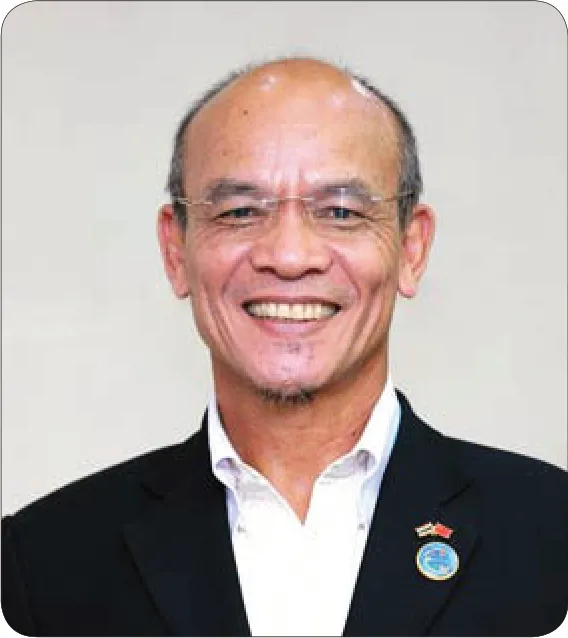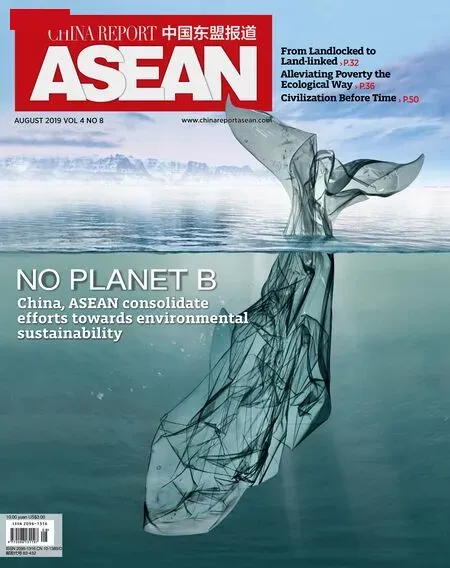BEAUTIFYING CHINESE AND THAI CIVILIZATIONS THROUGH EXCHANGES Exclusive interview with Director of Thai-Chinese Strategic Research Center Gen. Surasit Thanadtang
By Wang Hai

Surasit Thanadtang, director of the Thai-Chinese Strategic Research Center at the National Research Council of Thailand.
Gen. Surasit Thanadtang, director of the Thai-Chinese Strategic Research Center at the National Research Council of Thailand, has been a regular visitor to China and developed his own unique views on China's development, targeted poverty alleviation, bilateral cooperation with Thailand and many other issues. Recently, he sat down for an exclusive interview with China Report ASEAN.
China Report ASEAN: When did you make your first visit to China? What was your first impression?
Thanadtang:I first came to China in 1996. I was quite impressed with the country upon arrival. All the people were very friendly with us. What impressed me even more was realizing the importance of Sun Tzu's The Art of War in Western academia as I was doing graduate work overseas. I realized that it is a very important book for strategy and tactics as well as a guide for interdisciplinary management. I ended up studying the book extensively for future use. I also wanted to apply the knowledge in the book for maximum benefits. We should study broader Chinese institutions and mechanisms as well as its vision for future development. This is why I have frequented China so much to study its experience. China is my home away from home. I was also quite impressed with the Conference on Dialogue of Asian Civilizations held this May. “Asian countries are closely connected and share a natural bond of affinity,” declared President Xi Jinping at the opening ceremony. “We endured similar historical trials and share like-minded dreams for the future... Meanwhile, instability and uncertainty are mounting, and the global challenges facing humanity are becoming ever more daunting... To meet our common challenges and create a better future for all, we are looking to culture and civilization to play a greater role—theirs is as important as the role played by economics, science and technology.”
China Report ASEAN: After witnessing so much of China's development over the years, which region impressed you most?
Thanadtang:I grew up in the poor countryside in Thailand. I was quite happy to see China's measures and efforts in targeted poverty alleviation in rural areas. I hope to see more development in the remote regions in the future. My hometown used to be very poor. The government and people have also been working very hard to climb out of poverty. The idea of “Jeen Thai Phee Nong Gan” (China and Thailand are the members
"To meet our common challenges and create a better future for all, we are looking to culture and civilization to play a greater role-theirs is as important as the role played by economics, science and technology.” - Xi Jinpingof one family) remains deeply rooted among the people. I think the development model of southern China, especially the southwestern province of Yunnan which shares cultures and lifestyles similar to Thailand, can serve as a role model for us. China has also invested a lot in education in poverty-stricken regions. It takes time and patience as well as participation from all of society to reap the benefits of education. Personally, I will continue to engage in related research. I will continue to work with the scholars at think tanks in Yunnan Province to contribute more to the development of both our countries.
China Report ASEAN: In recent years, China and Thailand have made continuous progress with in-depth cooperation in various sectors such as railway construction and tourism. What do you think of the development of the two countries and their exchanges?
Thanadtang:Thailand has benefited a lot from tourism. Exchange of tourists is an effective method of cultural exchange as well. The two countries should open wider to each other to further develop tourism so the industry can contribute more to cultural exchange, common development and economic growth. The two countries should also strengthen cooperation in investment on major projects such as highspeed railways. Research institutions in both countries should strengthen cooperation on gathering information on the major projects to aid governmental decisionmaking. For example, on the high-speed railway project, we should determine precisely how Thailand will benefit from the project, how the project will make traveling easier for tourists and the impact on the general public and resources because such a major project is so expensive and will create a huge debt. I think the two sides are making steady progress on cooperation, especially on the high-speed railway connecting the three major airports of Thailand, which involves three parties: China, Thailand and Japan. I think high-speed railway projects should be more open for more parties to get involved to share the costs and rewards.
China Report ASEAN: What experience do you think China can provide in terms of research? Thanadtang:First and foremost, research resources include not only money but also human resources. I think China can provide us a lot of support with its big pool of human resources. Research resources cannot be obtained in a short period of time because they depend greatly on the experience of researchers. Cultivating the next generation of researchers is another key factor. China has attached great importance to its own team of researchers and tutors. I hope China can help us train a new generation of researchers through more cooperation projects. I also hope that the two countries establish a better research partnership to enhance the mutual understanding between governments and people.
China Report ASEAN: What do you think of the Belt and Road Initiative (BRI) as well as doubts about it from some Western countries?
Thanadtang:It's normal for some to doubt the initiative. There are several reasons. First, some Western countries are worried about losing what there once had. They once maintained a leading position in science, technology, finance and many other realms. They are now worried about losing this lead. Second, some Western countries led by the United States are worried about declining and falling behind China as China continues developing rapidly with cutting-edge technology such as 5G communication and the great potential of its human resources. Third, they are worried about a lack of funding for projects in which they have invested in many countries. That is why the U.S. has imposed some special clauses and sanctions on China. I think it will be very difficult for the U.S. to find cooperation partners for future investment projects. I think the apprehensions and criticisms of the BRI are coming from countries worried about China's strength and development pace. Still, some European countries with high international reputation such as Luxembourg and Switzerland are participating in the BRI. Their actions will gradually minimize doubts.

For more information, please scan the QR code.
- China Report Asean的其它文章
- CHINESE, VIETNAMESE COMMUNIST PARTIES HOLD 15TH THEORY SEMINAR
- SEIZING SUSTAINABLE SOLUTIONS CHINA SETS THE STANDARD FOR ALLEVIATING POVERTY AND PROMOTING ONGOING GROWTH
- CHINESE VP MEETS MALAYSIAN DEPUTY PM
- 2019 CHINAASEAN EDUCATION COOPERATION WEEK
- NO PLANET B
- LI: MORE OPEN, TRANSPARENT, PREDICTABLE CHINA FOR FOREIGN INVESTMENT

